Artificial Intelligence and Block Chain Technology in Accounting
VerifiedAdded on 2023/06/10
|9
|2195
|346
AI Summary
This article discusses the impact of Artificial Intelligence and Block Chain Technology in Accounting. It covers the potential usage in accounting in future and cases of usage of Block Chain and AI. It also talks about financial reporting regulation in future.
Contribute Materials
Your contribution can guide someone’s learning journey. Share your
documents today.
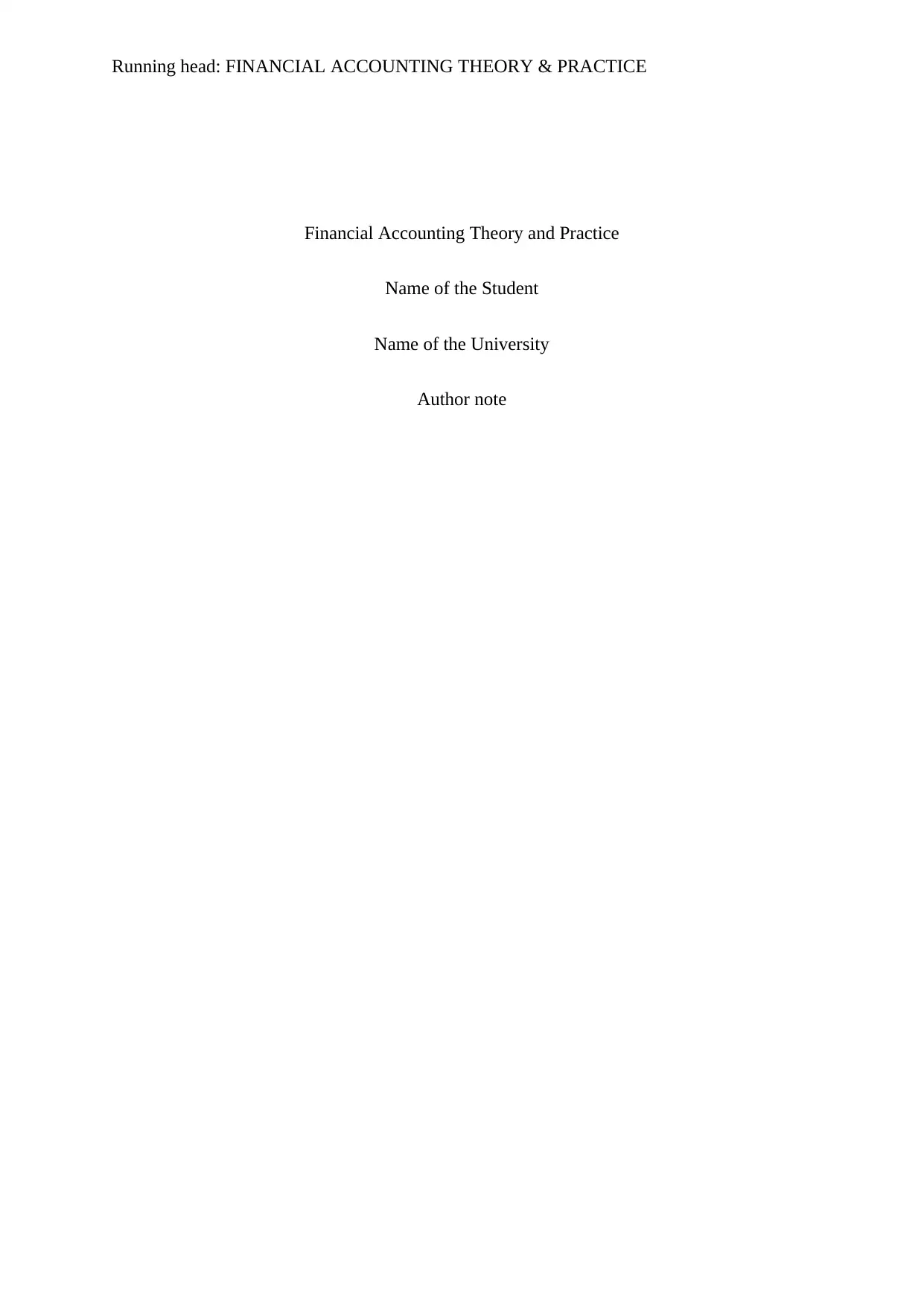
Running head: FINANCIAL ACCOUNTING THEORY & PRACTICE
Financial Accounting Theory and Practice
Name of the Student
Name of the University
Author note
Financial Accounting Theory and Practice
Name of the Student
Name of the University
Author note
Secure Best Marks with AI Grader
Need help grading? Try our AI Grader for instant feedback on your assignments.
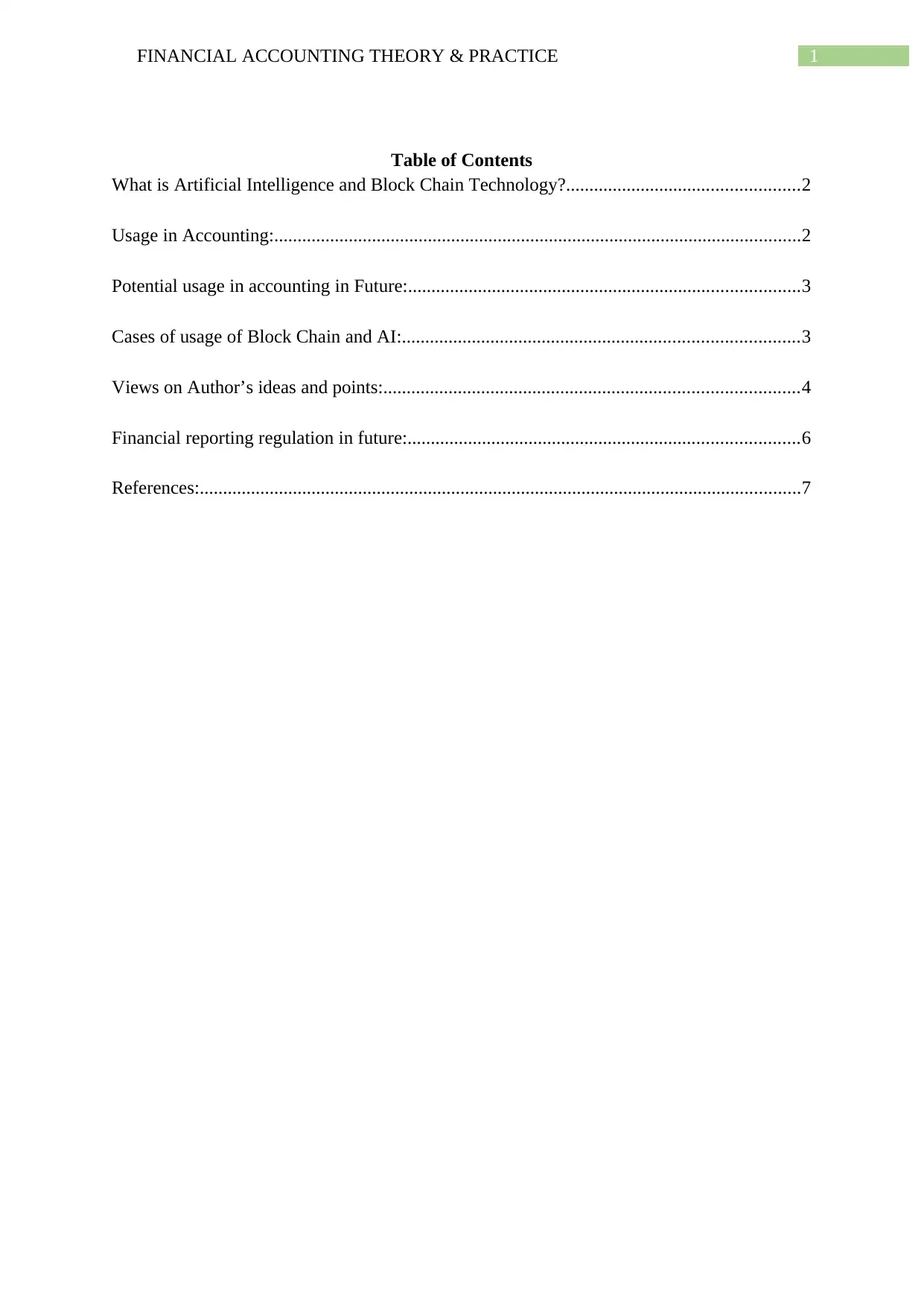
1FINANCIAL ACCOUNTING THEORY & PRACTICE
Table of Contents
What is Artificial Intelligence and Block Chain Technology?..................................................2
Usage in Accounting:.................................................................................................................2
Potential usage in accounting in Future:....................................................................................3
Cases of usage of Block Chain and AI:.....................................................................................3
Views on Author’s ideas and points:.........................................................................................4
Financial reporting regulation in future:....................................................................................6
References:.................................................................................................................................7
Table of Contents
What is Artificial Intelligence and Block Chain Technology?..................................................2
Usage in Accounting:.................................................................................................................2
Potential usage in accounting in Future:....................................................................................3
Cases of usage of Block Chain and AI:.....................................................................................3
Views on Author’s ideas and points:.........................................................................................4
Financial reporting regulation in future:....................................................................................6
References:.................................................................................................................................7
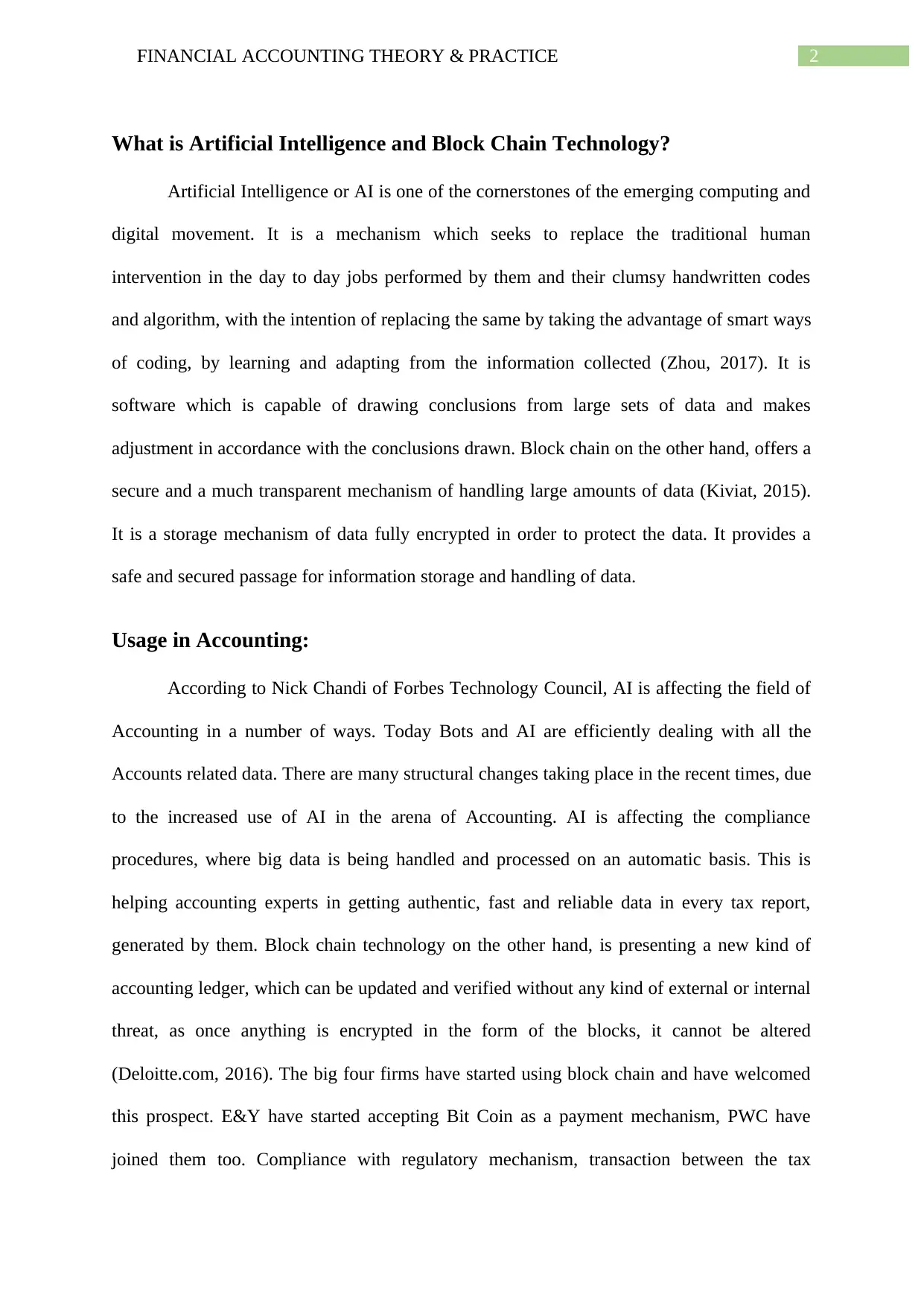
2FINANCIAL ACCOUNTING THEORY & PRACTICE
What is Artificial Intelligence and Block Chain Technology?
Artificial Intelligence or AI is one of the cornerstones of the emerging computing and
digital movement. It is a mechanism which seeks to replace the traditional human
intervention in the day to day jobs performed by them and their clumsy handwritten codes
and algorithm, with the intention of replacing the same by taking the advantage of smart ways
of coding, by learning and adapting from the information collected (Zhou, 2017). It is
software which is capable of drawing conclusions from large sets of data and makes
adjustment in accordance with the conclusions drawn. Block chain on the other hand, offers a
secure and a much transparent mechanism of handling large amounts of data (Kiviat, 2015).
It is a storage mechanism of data fully encrypted in order to protect the data. It provides a
safe and secured passage for information storage and handling of data.
Usage in Accounting:
According to Nick Chandi of Forbes Technology Council, AI is affecting the field of
Accounting in a number of ways. Today Bots and AI are efficiently dealing with all the
Accounts related data. There are many structural changes taking place in the recent times, due
to the increased use of AI in the arena of Accounting. AI is affecting the compliance
procedures, where big data is being handled and processed on an automatic basis. This is
helping accounting experts in getting authentic, fast and reliable data in every tax report,
generated by them. Block chain technology on the other hand, is presenting a new kind of
accounting ledger, which can be updated and verified without any kind of external or internal
threat, as once anything is encrypted in the form of the blocks, it cannot be altered
(Deloitte.com, 2016). The big four firms have started using block chain and have welcomed
this prospect. E&Y have started accepting Bit Coin as a payment mechanism, PWC have
joined them too. Compliance with regulatory mechanism, transaction between the tax
What is Artificial Intelligence and Block Chain Technology?
Artificial Intelligence or AI is one of the cornerstones of the emerging computing and
digital movement. It is a mechanism which seeks to replace the traditional human
intervention in the day to day jobs performed by them and their clumsy handwritten codes
and algorithm, with the intention of replacing the same by taking the advantage of smart ways
of coding, by learning and adapting from the information collected (Zhou, 2017). It is
software which is capable of drawing conclusions from large sets of data and makes
adjustment in accordance with the conclusions drawn. Block chain on the other hand, offers a
secure and a much transparent mechanism of handling large amounts of data (Kiviat, 2015).
It is a storage mechanism of data fully encrypted in order to protect the data. It provides a
safe and secured passage for information storage and handling of data.
Usage in Accounting:
According to Nick Chandi of Forbes Technology Council, AI is affecting the field of
Accounting in a number of ways. Today Bots and AI are efficiently dealing with all the
Accounts related data. There are many structural changes taking place in the recent times, due
to the increased use of AI in the arena of Accounting. AI is affecting the compliance
procedures, where big data is being handled and processed on an automatic basis. This is
helping accounting experts in getting authentic, fast and reliable data in every tax report,
generated by them. Block chain technology on the other hand, is presenting a new kind of
accounting ledger, which can be updated and verified without any kind of external or internal
threat, as once anything is encrypted in the form of the blocks, it cannot be altered
(Deloitte.com, 2016). The big four firms have started using block chain and have welcomed
this prospect. E&Y have started accepting Bit Coin as a payment mechanism, PWC have
joined them too. Compliance with regulatory mechanism, transaction between the tax
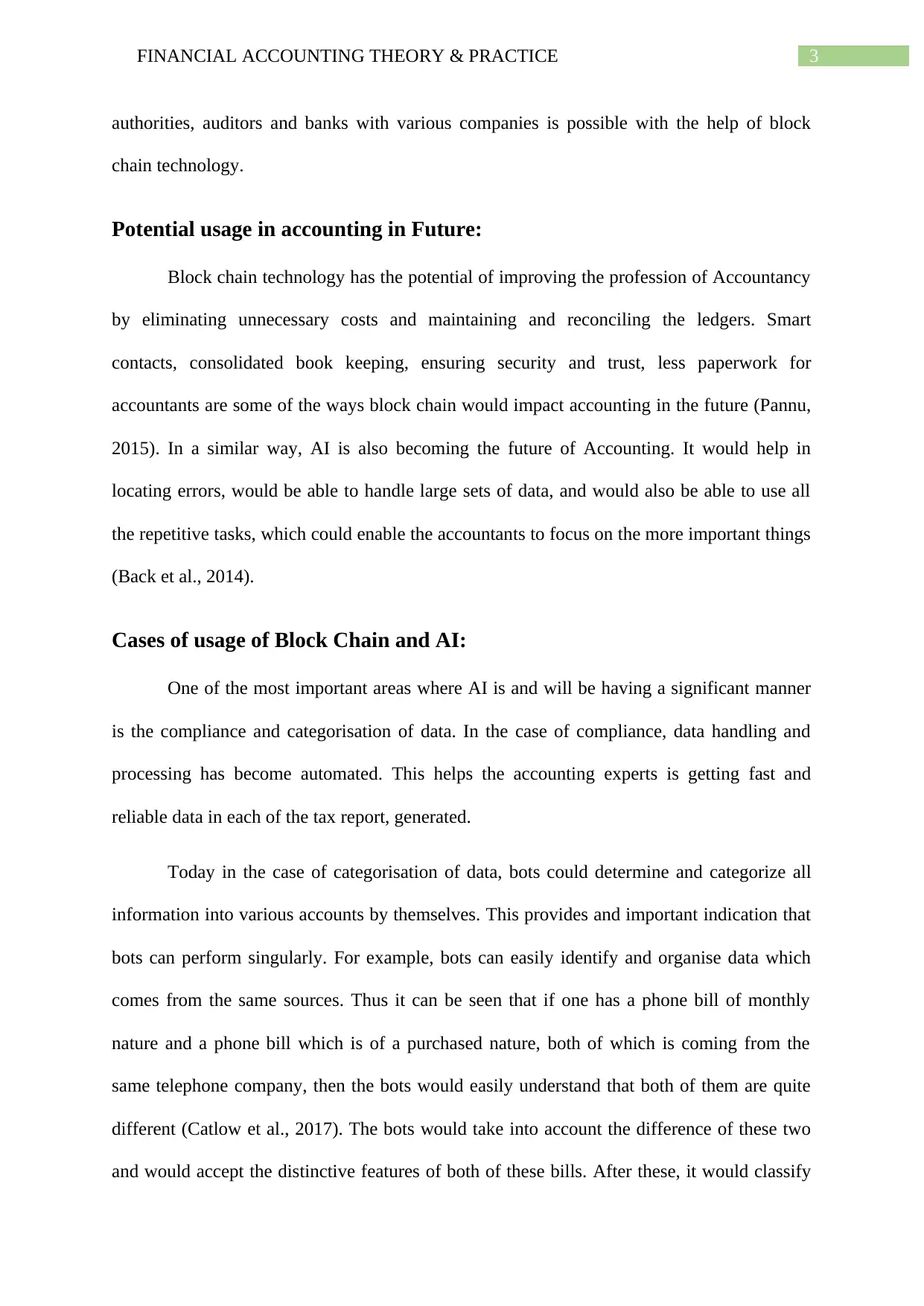
3FINANCIAL ACCOUNTING THEORY & PRACTICE
authorities, auditors and banks with various companies is possible with the help of block
chain technology.
Potential usage in accounting in Future:
Block chain technology has the potential of improving the profession of Accountancy
by eliminating unnecessary costs and maintaining and reconciling the ledgers. Smart
contacts, consolidated book keeping, ensuring security and trust, less paperwork for
accountants are some of the ways block chain would impact accounting in the future (Pannu,
2015). In a similar way, AI is also becoming the future of Accounting. It would help in
locating errors, would be able to handle large sets of data, and would also be able to use all
the repetitive tasks, which could enable the accountants to focus on the more important things
(Back et al., 2014).
Cases of usage of Block Chain and AI:
One of the most important areas where AI is and will be having a significant manner
is the compliance and categorisation of data. In the case of compliance, data handling and
processing has become automated. This helps the accounting experts is getting fast and
reliable data in each of the tax report, generated.
Today in the case of categorisation of data, bots could determine and categorize all
information into various accounts by themselves. This provides and important indication that
bots can perform singularly. For example, bots can easily identify and organise data which
comes from the same sources. Thus it can be seen that if one has a phone bill of monthly
nature and a phone bill which is of a purchased nature, both of which is coming from the
same telephone company, then the bots would easily understand that both of them are quite
different (Catlow et al., 2017). The bots would take into account the difference of these two
and would accept the distinctive features of both of these bills. After these, it would classify
authorities, auditors and banks with various companies is possible with the help of block
chain technology.
Potential usage in accounting in Future:
Block chain technology has the potential of improving the profession of Accountancy
by eliminating unnecessary costs and maintaining and reconciling the ledgers. Smart
contacts, consolidated book keeping, ensuring security and trust, less paperwork for
accountants are some of the ways block chain would impact accounting in the future (Pannu,
2015). In a similar way, AI is also becoming the future of Accounting. It would help in
locating errors, would be able to handle large sets of data, and would also be able to use all
the repetitive tasks, which could enable the accountants to focus on the more important things
(Back et al., 2014).
Cases of usage of Block Chain and AI:
One of the most important areas where AI is and will be having a significant manner
is the compliance and categorisation of data. In the case of compliance, data handling and
processing has become automated. This helps the accounting experts is getting fast and
reliable data in each of the tax report, generated.
Today in the case of categorisation of data, bots could determine and categorize all
information into various accounts by themselves. This provides and important indication that
bots can perform singularly. For example, bots can easily identify and organise data which
comes from the same sources. Thus it can be seen that if one has a phone bill of monthly
nature and a phone bill which is of a purchased nature, both of which is coming from the
same telephone company, then the bots would easily understand that both of them are quite
different (Catlow et al., 2017). The bots would take into account the difference of these two
and would accept the distinctive features of both of these bills. After these, it would classify
Secure Best Marks with AI Grader
Need help grading? Try our AI Grader for instant feedback on your assignments.
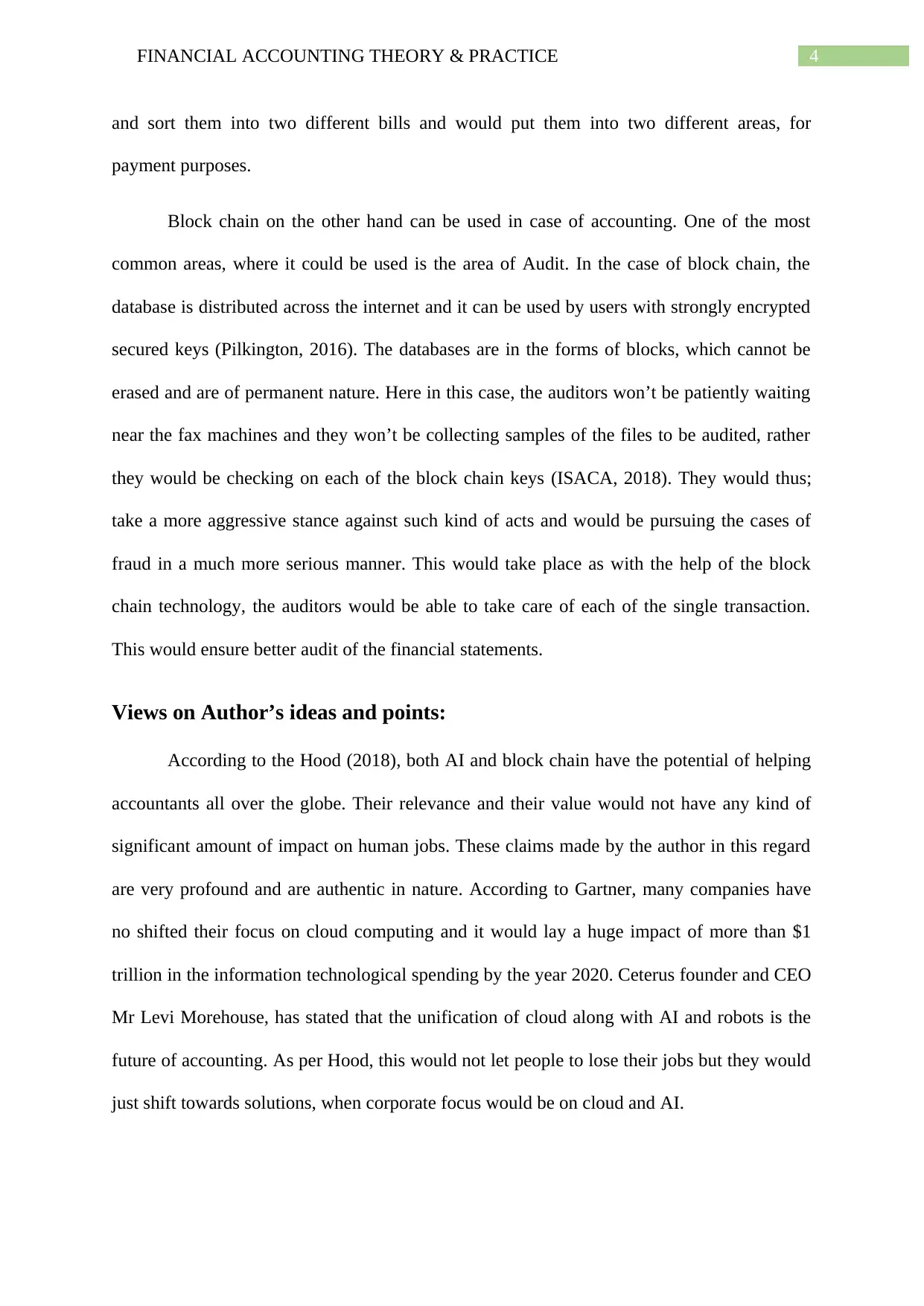
4FINANCIAL ACCOUNTING THEORY & PRACTICE
and sort them into two different bills and would put them into two different areas, for
payment purposes.
Block chain on the other hand can be used in case of accounting. One of the most
common areas, where it could be used is the area of Audit. In the case of block chain, the
database is distributed across the internet and it can be used by users with strongly encrypted
secured keys (Pilkington, 2016). The databases are in the forms of blocks, which cannot be
erased and are of permanent nature. Here in this case, the auditors won’t be patiently waiting
near the fax machines and they won’t be collecting samples of the files to be audited, rather
they would be checking on each of the block chain keys (ISACA, 2018). They would thus;
take a more aggressive stance against such kind of acts and would be pursuing the cases of
fraud in a much more serious manner. This would take place as with the help of the block
chain technology, the auditors would be able to take care of each of the single transaction.
This would ensure better audit of the financial statements.
Views on Author’s ideas and points:
According to the Hood (2018), both AI and block chain have the potential of helping
accountants all over the globe. Their relevance and their value would not have any kind of
significant amount of impact on human jobs. These claims made by the author in this regard
are very profound and are authentic in nature. According to Gartner, many companies have
no shifted their focus on cloud computing and it would lay a huge impact of more than $1
trillion in the information technological spending by the year 2020. Ceterus founder and CEO
Mr Levi Morehouse, has stated that the unification of cloud along with AI and robots is the
future of accounting. As per Hood, this would not let people to lose their jobs but they would
just shift towards solutions, when corporate focus would be on cloud and AI.
and sort them into two different bills and would put them into two different areas, for
payment purposes.
Block chain on the other hand can be used in case of accounting. One of the most
common areas, where it could be used is the area of Audit. In the case of block chain, the
database is distributed across the internet and it can be used by users with strongly encrypted
secured keys (Pilkington, 2016). The databases are in the forms of blocks, which cannot be
erased and are of permanent nature. Here in this case, the auditors won’t be patiently waiting
near the fax machines and they won’t be collecting samples of the files to be audited, rather
they would be checking on each of the block chain keys (ISACA, 2018). They would thus;
take a more aggressive stance against such kind of acts and would be pursuing the cases of
fraud in a much more serious manner. This would take place as with the help of the block
chain technology, the auditors would be able to take care of each of the single transaction.
This would ensure better audit of the financial statements.
Views on Author’s ideas and points:
According to the Hood (2018), both AI and block chain have the potential of helping
accountants all over the globe. Their relevance and their value would not have any kind of
significant amount of impact on human jobs. These claims made by the author in this regard
are very profound and are authentic in nature. According to Gartner, many companies have
no shifted their focus on cloud computing and it would lay a huge impact of more than $1
trillion in the information technological spending by the year 2020. Ceterus founder and CEO
Mr Levi Morehouse, has stated that the unification of cloud along with AI and robots is the
future of accounting. As per Hood, this would not let people to lose their jobs but they would
just shift towards solutions, when corporate focus would be on cloud and AI.
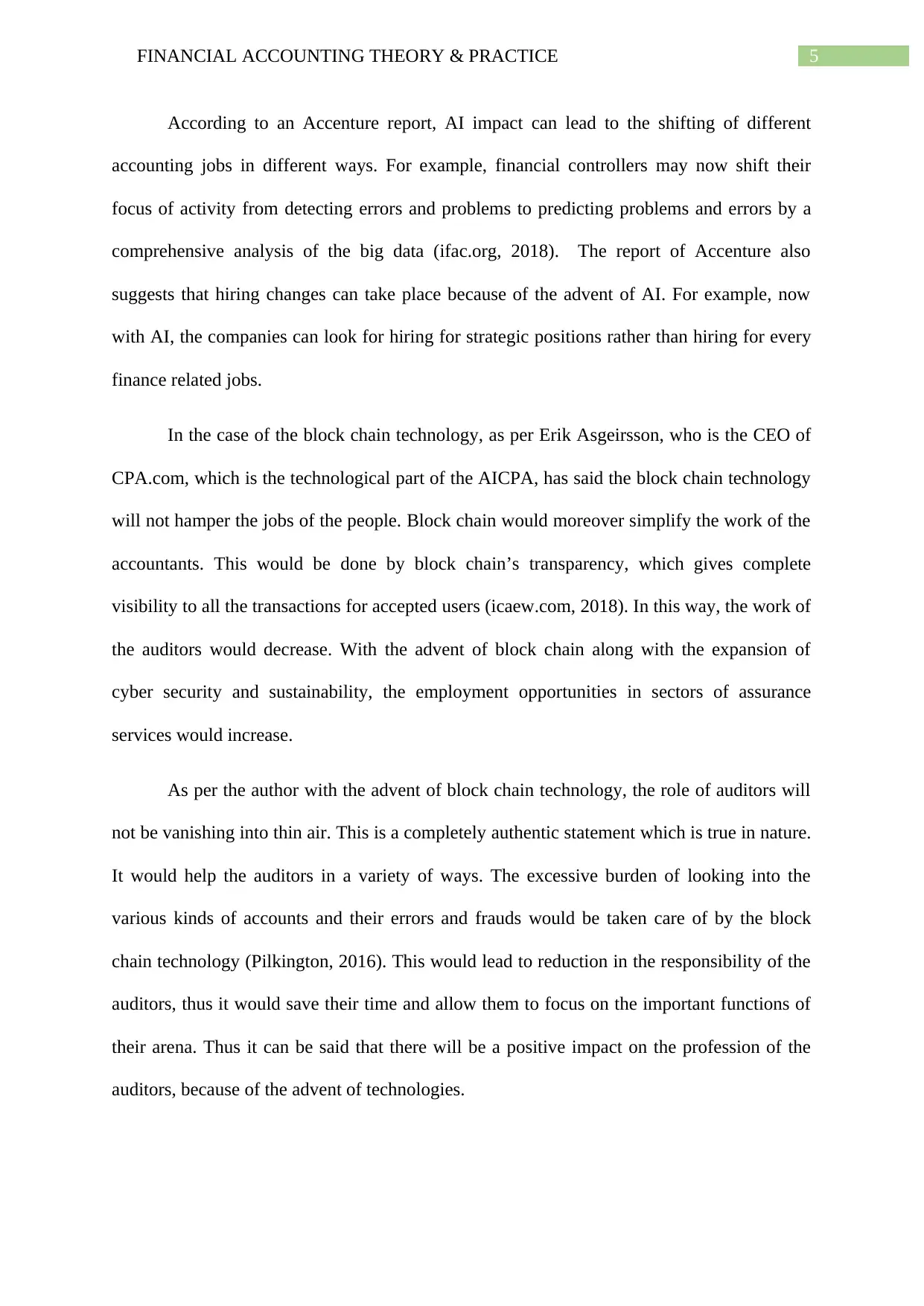
5FINANCIAL ACCOUNTING THEORY & PRACTICE
According to an Accenture report, AI impact can lead to the shifting of different
accounting jobs in different ways. For example, financial controllers may now shift their
focus of activity from detecting errors and problems to predicting problems and errors by a
comprehensive analysis of the big data (ifac.org, 2018). The report of Accenture also
suggests that hiring changes can take place because of the advent of AI. For example, now
with AI, the companies can look for hiring for strategic positions rather than hiring for every
finance related jobs.
In the case of the block chain technology, as per Erik Asgeirsson, who is the CEO of
CPA.com, which is the technological part of the AICPA, has said the block chain technology
will not hamper the jobs of the people. Block chain would moreover simplify the work of the
accountants. This would be done by block chain’s transparency, which gives complete
visibility to all the transactions for accepted users (icaew.com, 2018). In this way, the work of
the auditors would decrease. With the advent of block chain along with the expansion of
cyber security and sustainability, the employment opportunities in sectors of assurance
services would increase.
As per the author with the advent of block chain technology, the role of auditors will
not be vanishing into thin air. This is a completely authentic statement which is true in nature.
It would help the auditors in a variety of ways. The excessive burden of looking into the
various kinds of accounts and their errors and frauds would be taken care of by the block
chain technology (Pilkington, 2016). This would lead to reduction in the responsibility of the
auditors, thus it would save their time and allow them to focus on the important functions of
their arena. Thus it can be said that there will be a positive impact on the profession of the
auditors, because of the advent of technologies.
According to an Accenture report, AI impact can lead to the shifting of different
accounting jobs in different ways. For example, financial controllers may now shift their
focus of activity from detecting errors and problems to predicting problems and errors by a
comprehensive analysis of the big data (ifac.org, 2018). The report of Accenture also
suggests that hiring changes can take place because of the advent of AI. For example, now
with AI, the companies can look for hiring for strategic positions rather than hiring for every
finance related jobs.
In the case of the block chain technology, as per Erik Asgeirsson, who is the CEO of
CPA.com, which is the technological part of the AICPA, has said the block chain technology
will not hamper the jobs of the people. Block chain would moreover simplify the work of the
accountants. This would be done by block chain’s transparency, which gives complete
visibility to all the transactions for accepted users (icaew.com, 2018). In this way, the work of
the auditors would decrease. With the advent of block chain along with the expansion of
cyber security and sustainability, the employment opportunities in sectors of assurance
services would increase.
As per the author with the advent of block chain technology, the role of auditors will
not be vanishing into thin air. This is a completely authentic statement which is true in nature.
It would help the auditors in a variety of ways. The excessive burden of looking into the
various kinds of accounts and their errors and frauds would be taken care of by the block
chain technology (Pilkington, 2016). This would lead to reduction in the responsibility of the
auditors, thus it would save their time and allow them to focus on the important functions of
their arena. Thus it can be said that there will be a positive impact on the profession of the
auditors, because of the advent of technologies.
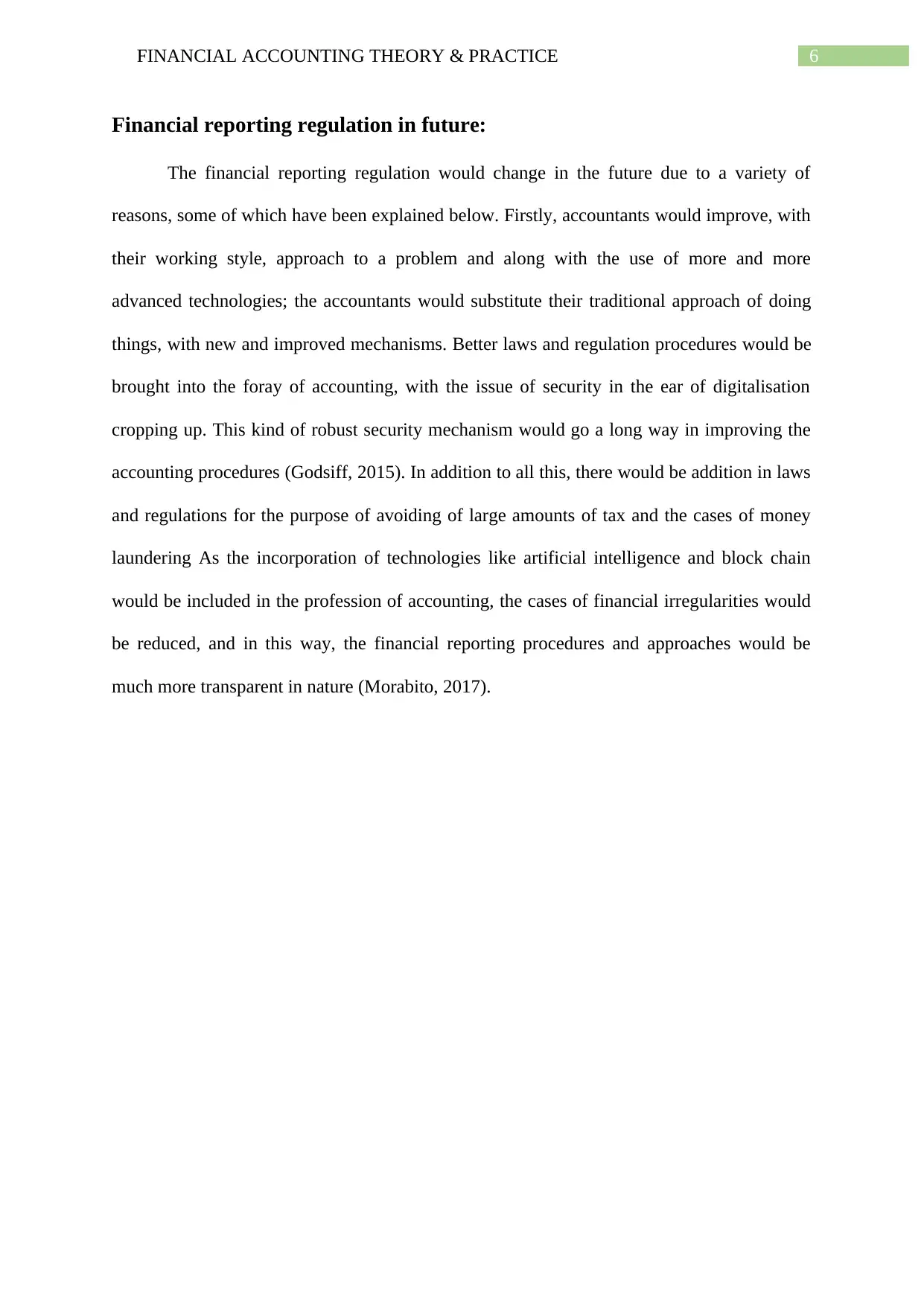
6FINANCIAL ACCOUNTING THEORY & PRACTICE
Financial reporting regulation in future:
The financial reporting regulation would change in the future due to a variety of
reasons, some of which have been explained below. Firstly, accountants would improve, with
their working style, approach to a problem and along with the use of more and more
advanced technologies; the accountants would substitute their traditional approach of doing
things, with new and improved mechanisms. Better laws and regulation procedures would be
brought into the foray of accounting, with the issue of security in the ear of digitalisation
cropping up. This kind of robust security mechanism would go a long way in improving the
accounting procedures (Godsiff, 2015). In addition to all this, there would be addition in laws
and regulations for the purpose of avoiding of large amounts of tax and the cases of money
laundering As the incorporation of technologies like artificial intelligence and block chain
would be included in the profession of accounting, the cases of financial irregularities would
be reduced, and in this way, the financial reporting procedures and approaches would be
much more transparent in nature (Morabito, 2017).
Financial reporting regulation in future:
The financial reporting regulation would change in the future due to a variety of
reasons, some of which have been explained below. Firstly, accountants would improve, with
their working style, approach to a problem and along with the use of more and more
advanced technologies; the accountants would substitute their traditional approach of doing
things, with new and improved mechanisms. Better laws and regulation procedures would be
brought into the foray of accounting, with the issue of security in the ear of digitalisation
cropping up. This kind of robust security mechanism would go a long way in improving the
accounting procedures (Godsiff, 2015). In addition to all this, there would be addition in laws
and regulations for the purpose of avoiding of large amounts of tax and the cases of money
laundering As the incorporation of technologies like artificial intelligence and block chain
would be included in the profession of accounting, the cases of financial irregularities would
be reduced, and in this way, the financial reporting procedures and approaches would be
much more transparent in nature (Morabito, 2017).
Paraphrase This Document
Need a fresh take? Get an instant paraphrase of this document with our AI Paraphraser
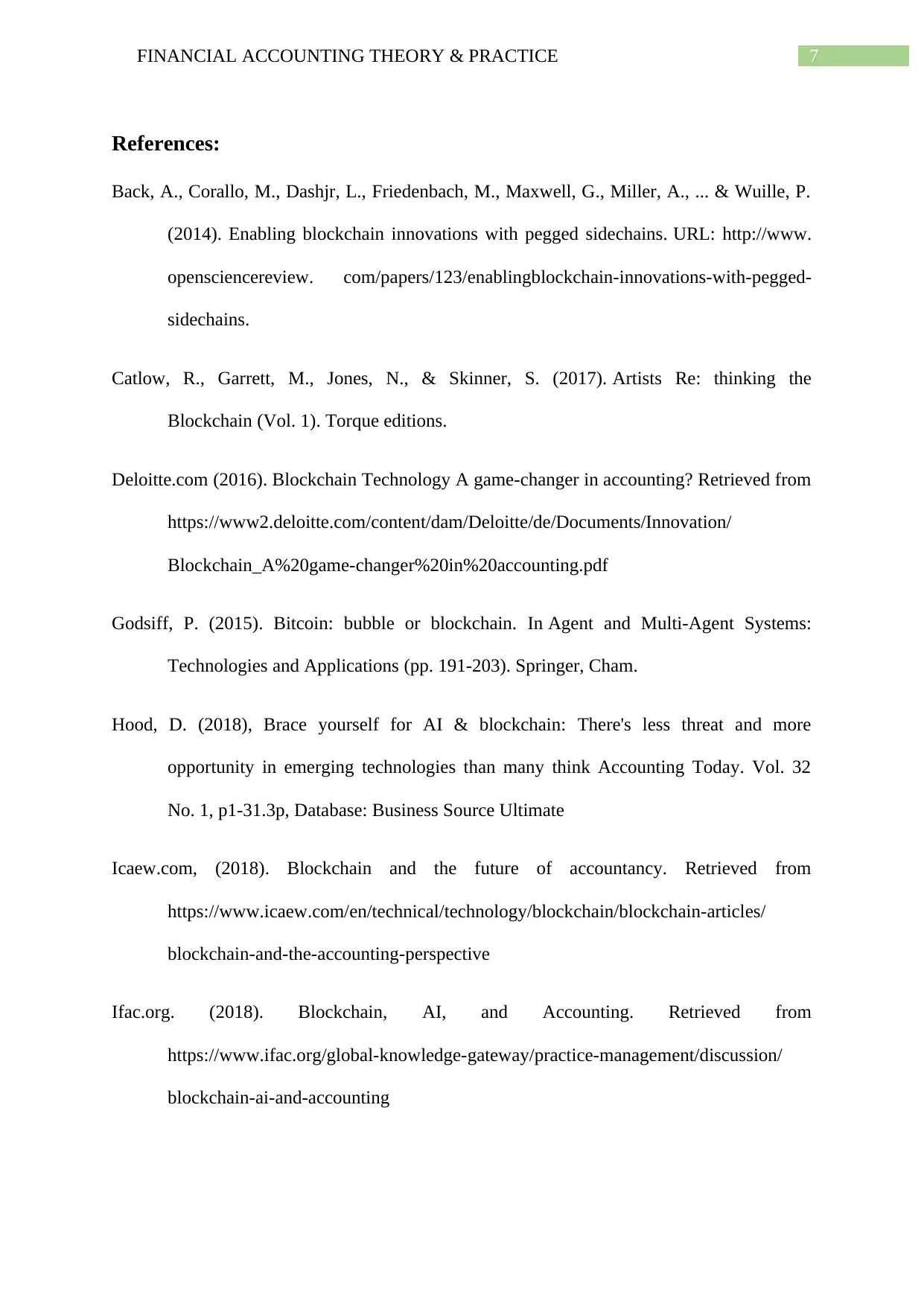
7FINANCIAL ACCOUNTING THEORY & PRACTICE
References:
Back, A., Corallo, M., Dashjr, L., Friedenbach, M., Maxwell, G., Miller, A., ... & Wuille, P.
(2014). Enabling blockchain innovations with pegged sidechains. URL: http://www.
opensciencereview. com/papers/123/enablingblockchain-innovations-with-pegged-
sidechains.
Catlow, R., Garrett, M., Jones, N., & Skinner, S. (2017). Artists Re: thinking the
Blockchain (Vol. 1). Torque editions.
Deloitte.com (2016). Blockchain Technology A game-changer in accounting? Retrieved from
https://www2.deloitte.com/content/dam/Deloitte/de/Documents/Innovation/
Blockchain_A%20game-changer%20in%20accounting.pdf
Godsiff, P. (2015). Bitcoin: bubble or blockchain. In Agent and Multi-Agent Systems:
Technologies and Applications (pp. 191-203). Springer, Cham.
Hood, D. (2018), Brace yourself for AI & blockchain: There's less threat and more
opportunity in emerging technologies than many think Accounting Today. Vol. 32
No. 1, p1-31.3p, Database: Business Source Ultimate
Icaew.com, (2018). Blockchain and the future of accountancy. Retrieved from
https://www.icaew.com/en/technical/technology/blockchain/blockchain-articles/
blockchain-and-the-accounting-perspective
Ifac.org. (2018). Blockchain, AI, and Accounting. Retrieved from
https://www.ifac.org/global-knowledge-gateway/practice-management/discussion/
blockchain-ai-and-accounting
References:
Back, A., Corallo, M., Dashjr, L., Friedenbach, M., Maxwell, G., Miller, A., ... & Wuille, P.
(2014). Enabling blockchain innovations with pegged sidechains. URL: http://www.
opensciencereview. com/papers/123/enablingblockchain-innovations-with-pegged-
sidechains.
Catlow, R., Garrett, M., Jones, N., & Skinner, S. (2017). Artists Re: thinking the
Blockchain (Vol. 1). Torque editions.
Deloitte.com (2016). Blockchain Technology A game-changer in accounting? Retrieved from
https://www2.deloitte.com/content/dam/Deloitte/de/Documents/Innovation/
Blockchain_A%20game-changer%20in%20accounting.pdf
Godsiff, P. (2015). Bitcoin: bubble or blockchain. In Agent and Multi-Agent Systems:
Technologies and Applications (pp. 191-203). Springer, Cham.
Hood, D. (2018), Brace yourself for AI & blockchain: There's less threat and more
opportunity in emerging technologies than many think Accounting Today. Vol. 32
No. 1, p1-31.3p, Database: Business Source Ultimate
Icaew.com, (2018). Blockchain and the future of accountancy. Retrieved from
https://www.icaew.com/en/technical/technology/blockchain/blockchain-articles/
blockchain-and-the-accounting-perspective
Ifac.org. (2018). Blockchain, AI, and Accounting. Retrieved from
https://www.ifac.org/global-knowledge-gateway/practice-management/discussion/
blockchain-ai-and-accounting
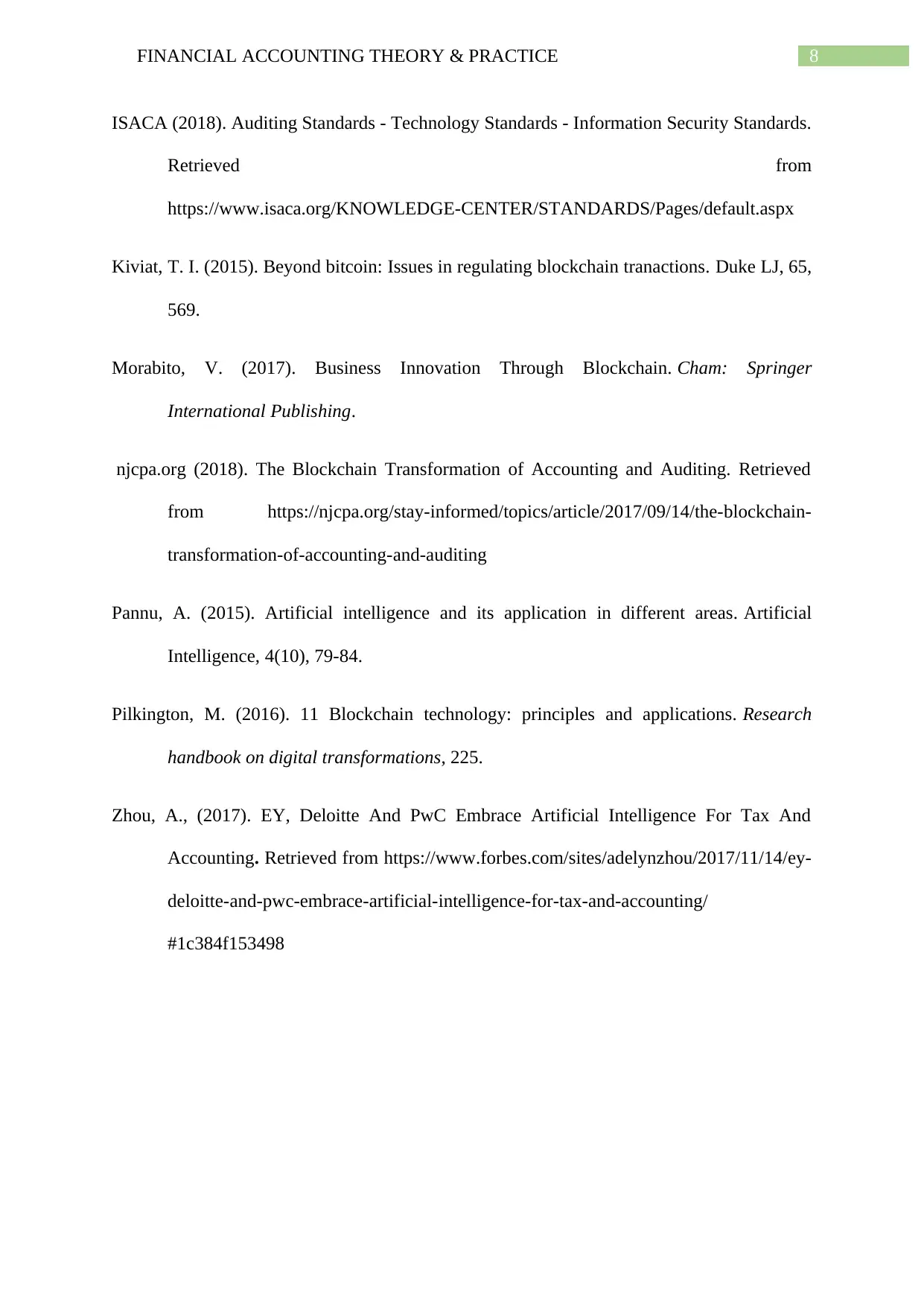
8FINANCIAL ACCOUNTING THEORY & PRACTICE
ISACA (2018). Auditing Standards - Technology Standards - Information Security Standards.
Retrieved from
https://www.isaca.org/KNOWLEDGE-CENTER/STANDARDS/Pages/default.aspx
Kiviat, T. I. (2015). Beyond bitcoin: Issues in regulating blockchain tranactions. Duke LJ, 65,
569.
Morabito, V. (2017). Business Innovation Through Blockchain. Cham: Springer
International Publishing.
njcpa.org (2018). The Blockchain Transformation of Accounting and Auditing. Retrieved
from https://njcpa.org/stay-informed/topics/article/2017/09/14/the-blockchain-
transformation-of-accounting-and-auditing
Pannu, A. (2015). Artificial intelligence and its application in different areas. Artificial
Intelligence, 4(10), 79-84.
Pilkington, M. (2016). 11 Blockchain technology: principles and applications. Research
handbook on digital transformations, 225.
Zhou, A., (2017). EY, Deloitte And PwC Embrace Artificial Intelligence For Tax And
Accounting. Retrieved from https://www.forbes.com/sites/adelynzhou/2017/11/14/ey-
deloitte-and-pwc-embrace-artificial-intelligence-for-tax-and-accounting/
#1c384f153498
ISACA (2018). Auditing Standards - Technology Standards - Information Security Standards.
Retrieved from
https://www.isaca.org/KNOWLEDGE-CENTER/STANDARDS/Pages/default.aspx
Kiviat, T. I. (2015). Beyond bitcoin: Issues in regulating blockchain tranactions. Duke LJ, 65,
569.
Morabito, V. (2017). Business Innovation Through Blockchain. Cham: Springer
International Publishing.
njcpa.org (2018). The Blockchain Transformation of Accounting and Auditing. Retrieved
from https://njcpa.org/stay-informed/topics/article/2017/09/14/the-blockchain-
transformation-of-accounting-and-auditing
Pannu, A. (2015). Artificial intelligence and its application in different areas. Artificial
Intelligence, 4(10), 79-84.
Pilkington, M. (2016). 11 Blockchain technology: principles and applications. Research
handbook on digital transformations, 225.
Zhou, A., (2017). EY, Deloitte And PwC Embrace Artificial Intelligence For Tax And
Accounting. Retrieved from https://www.forbes.com/sites/adelynzhou/2017/11/14/ey-
deloitte-and-pwc-embrace-artificial-intelligence-for-tax-and-accounting/
#1c384f153498
1 out of 9
Related Documents
Your All-in-One AI-Powered Toolkit for Academic Success.
+13062052269
info@desklib.com
Available 24*7 on WhatsApp / Email
![[object Object]](/_next/static/media/star-bottom.7253800d.svg)
Unlock your academic potential
© 2024 | Zucol Services PVT LTD | All rights reserved.


